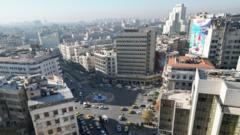The Israeli Defense Forces (IDF) have conducted over 310 airstrikes in Syria, largely targeting military facilities, as a response to the recent transition in the Syrian government following the fall of Bashar al-Assad. This surge in military activity has drawn both national and international reactions, posing questions about the future of peace in the region.
Israeli Airstrikes Surge in Post-Assad Syria Amid Rising Tensions

Israeli Airstrikes Surge in Post-Assad Syria Amid Rising Tensions
Over 300 Israeli airstrikes have been reported in Syria since the fall of Bashar al-Assad, raising international concerns about regional stability and military engagement.
Israeli warplanes have significantly intensified their airstrike operations in Syria, reportedly exceeding 300 attacks following the dramatic fall of Bashar al-Assad's regime. Documentation from the UK-based Syrian Observatory for Human Rights (SOHR) reveals that more than 310 strikes have been carried out by the Israel Defense Forces (IDF) since Sunday, marking a notable escalation in Israeli military involvement as Syria experiences a transitional phase in its governance.
The IDF has confirmed that its forces are engaged within Syrian territories that extend beyond the previously established demilitarized buffer zone near the Israeli-occupied Golan Heights. Israeli officials have stated that these military actions aim to prevent critical weapon supplies from reaching extremist factions amid the shifting power dynamics in Syria. Strikes have struck key military installations across various cities including Aleppo, Damascus, and Hama, with recent operations reportedly resulting in the total destruction of certain military facilities.
Prominent Syrian civil rights advocate Rami Abdul Rahman characterized the consequences of the Israeli strikes as having devastated "all the capabilities of the Syrian army," underscoring the gravity of the situation as he described ongoing violations of Syrian sovereignty. Verification from external sources, including BBC reports, has confirmed the occurrence of some strikes, notably one against a naval facility in Latakia.
The IDF, while acknowledging the operation of troops within Syrian territory, has issued statements refuting claims of significant military advances towards Damascus, emphasizing that they are stationed primarily in the Area of Separation. The situation remains volatile with the Israeli Prime Minister, Benjamin Netanyahu, expressing a desire for constructive relations with emerging forces in the region, while firmly stating that Israel's safety is paramount.
This military escalation has drawn criticism from neighboring Turkey, which condemned Israel's incursions into the buffer zone as evidence of an "occupying mentality" during a crucial period for peace and stability in Syria. Established through a ceasefire agreement in 1974, this Area of Separation has been a focal point of Israeli-Syrian tensions post the Golan Heights annexation.
Critical responses from international actors have escalated, with Israeli officials continuously reaffirming their military actions as essential for homeland security. They underline concerns regarding the management of suspected chemical weapon stockpiles within Syria, an issue that remains inadequately addressed amid the ongoing conflicts and political upheaval.
As the region navigates this new geopolitical landscape following Assad's removal, the ramifications of continued Israeli air operations could greatly influence both the humanitarian situation on the ground and the broader quest for stability in post-Assad Syria.
The IDF has confirmed that its forces are engaged within Syrian territories that extend beyond the previously established demilitarized buffer zone near the Israeli-occupied Golan Heights. Israeli officials have stated that these military actions aim to prevent critical weapon supplies from reaching extremist factions amid the shifting power dynamics in Syria. Strikes have struck key military installations across various cities including Aleppo, Damascus, and Hama, with recent operations reportedly resulting in the total destruction of certain military facilities.
Prominent Syrian civil rights advocate Rami Abdul Rahman characterized the consequences of the Israeli strikes as having devastated "all the capabilities of the Syrian army," underscoring the gravity of the situation as he described ongoing violations of Syrian sovereignty. Verification from external sources, including BBC reports, has confirmed the occurrence of some strikes, notably one against a naval facility in Latakia.
The IDF, while acknowledging the operation of troops within Syrian territory, has issued statements refuting claims of significant military advances towards Damascus, emphasizing that they are stationed primarily in the Area of Separation. The situation remains volatile with the Israeli Prime Minister, Benjamin Netanyahu, expressing a desire for constructive relations with emerging forces in the region, while firmly stating that Israel's safety is paramount.
This military escalation has drawn criticism from neighboring Turkey, which condemned Israel's incursions into the buffer zone as evidence of an "occupying mentality" during a crucial period for peace and stability in Syria. Established through a ceasefire agreement in 1974, this Area of Separation has been a focal point of Israeli-Syrian tensions post the Golan Heights annexation.
Critical responses from international actors have escalated, with Israeli officials continuously reaffirming their military actions as essential for homeland security. They underline concerns regarding the management of suspected chemical weapon stockpiles within Syria, an issue that remains inadequately addressed amid the ongoing conflicts and political upheaval.
As the region navigates this new geopolitical landscape following Assad's removal, the ramifications of continued Israeli air operations could greatly influence both the humanitarian situation on the ground and the broader quest for stability in post-Assad Syria.



















